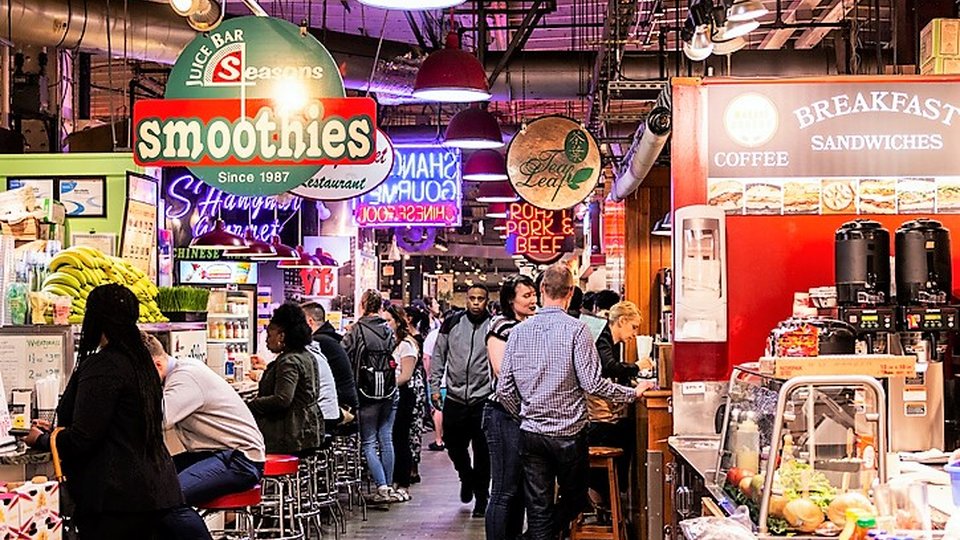Commentary
More competition for us – food halls. What’s a food hall?
Food halls are the next evolution of those mall-based food courts. You might describe it as a food court on steroids. Convenience service operators cannot afford to ignore them.

February 25, 2020 by Paul Schlossberg — president, dfw consulting
Was one of our industry's New Year's wishes for less competitive pressure? How is that working out for us? We just found a new competitive threat. It's probably not on our radar screens — not yet anyway. Food halls are here. They will have an impact on how we adapt for the future.
Depending on where your business is located, this might be an emerging competitive challenger. If your locations are in or near city centers, food halls are something "old" that has become something "new." Do you remember the food courts at shopping malls? Food halls are the next evolution of those mall-based food courts. You might describe it as a food court on steroids.
Shopping malls in transition
Shopping malls around the U.S. are in transition. Many older malls are closing. Among the surviving winners, we're seeing major adaptations and enhancements to retain their shoppers and attract new ones.
Our focus now is on food, not retail stores. We're not going to dive deeply into the subject shopping malls. But if you want to learn more, check out the Business Insider article from Nov. 18, 2019, "50 haunting photos of abandoned shopping malls across America" — an update from a January 2018 article.
CBS Sunday Morning News has been covering the development of food halls. Their first report, to my knowledge, was on Feb. 10, 2016. On Nov. 24, 2019, there was another report — "Redesigning the dining experience." In 2015 there were 70 food halls in nationwide. Today there are 400.
There was a conversation with Phil Colicchio, a consultant with Cushman & Wakefield, the real estate firm. "Even if you've been here 10 times, you walk in and you're discovering something different. The food court was never really designed to give you an experience of any kind. It wasn't designed to make you say, 'Wow.' In a food hall, all your senses should get activated. Lots of variety, lots of artisanality."
What it means to you
The key words for me were "experience" and "artisanality." Think about our business. What should we be learning from what these food halls are doing? Specifically:
1. What sort of dining experience do we offer our shoppers?
2. How often do our shoppers "discover something different" when they shop in our stores?
3. Could we describe any products we sell as "artisanal" — which can be simplified to being "made to order" or "made from scratch" while the shopper is waiting for it to be finished and served?
To be fair and reasonable, preparing and serving food this way is not something that is in our business model. Artisanality is not what we do. For the foreseeable future, it probably should not be.
But food halls are reaching places where there probably will be an impact on our day-to-day business. On Aug. 13, 2019, The Wall Street Journal ran an article, "Food Halls Hit Academia." Columbia University in New York City is opening their food hall in the summer of 2020. The article cites a Cushman & Wakefield report.
"Purdue University in Indiana, Auburn University in Alabama and the University of Nebraska also have food-hall projects in the works," according to Cushman & Wakefield. "The halls are a popular choice for real estate brokers and culinary pros because they have lower operating expenses than free-standing restaurants and offer dining flexibility to customers."
The Wall Street Journal also reported that "Franklin's Table, one of the first food halls on a college campus, opened in 2018 in Philadelphia...(and) is used by both the University of Pennsylvania and Drexel University."
If you are serving college locations, this is very important news. Stay in close contact with your on-campus hosts. You need to be aware of a new competitive venue. How close will it be to where your site is located?
Do you have any food halls operating nearby? Make it a priority to visit and dine at one or more of the brands and menu concepts they're offering. Be aware of what you can do to offer a better experience for the shoppers you serve. Work on a menu rotation process in every product category so shoppers can "discover something different."
Food halls are a new and different competitive development. Do you want to sell more stuff? Take a lesson from food halls.
 ChatGPT
ChatGPT Grok
Grok Perplexity
Perplexity Claude
Claude






